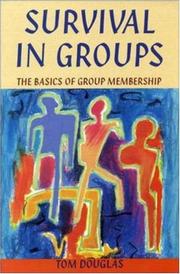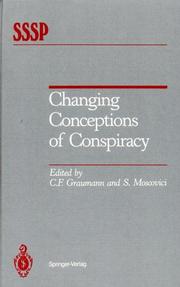| Listing 1 - 10 of 101 | << page >> |
Sort by
|

ISBN: 0335194125 0335194133 Year: 1995 Publisher: Buckingham Open university press
Abstract | Keywords | Export | Availability | Bookmark
 Loading...
Loading...Choose an application
- Reference Manager
- EndNote
- RefWorks (Direct export to RefWorks)
Collective behavior --- Small groups --- Comportement collectif --- Petits groupes --- Behavior, Collective --- Crowd behavior --- Crowds --- Mass behavior --- Groups, Small --- Psychology --- Human behavior --- Social action --- Social psychology --- Social groups

ISBN: 1282553240 0820336475 9780820336473 0820329134 9780820329130 9781282553248 Year: 2007 Publisher: Athens University of Georgia Press
Abstract | Keywords | Export | Availability | Bookmark
 Loading...
Loading...Choose an application
- Reference Manager
- EndNote
- RefWorks (Direct export to RefWorks)
Democracy --- Collective behavior --- Political leadership --- Behavior, Collective --- Crowd behavior --- Crowds --- Mass behavior --- Human behavior --- Social action --- Social psychology --- History. --- Psychology --- United States --- Politics and government
Book
ISBN: 1498500439 0739188976 9780739188972 1322064458 9781322064451 9780739188965 0739188968 9781498500432 Year: 2014 Publisher: Lanham
Abstract | Keywords | Export | Availability | Bookmark
 Loading...
Loading...Choose an application
- Reference Manager
- EndNote
- RefWorks (Direct export to RefWorks)
This book offers a transnational and transdisciplinary investigation of violence, ranging from bullying and hate crimes to revolutions, genocide, and terrorism. It offers empirical investigations of these specific types of violence as well as theoretical discussions of the underlying similarities and differences among these forms of violence.
Violence. --- Small groups --- Collective behavior. --- Behavior, Collective --- Crowd behavior --- Crowds --- Mass behavior --- Human behavior --- Social action --- Social psychology --- Violent behavior --- Psychological aspects. --- Psychology
Book
ISBN: 9780191757938 Year: 2014 Publisher: Oxford Oxford University Press
Abstract | Keywords | Export | Availability | Bookmark
 Loading...
Loading...Choose an application
- Reference Manager
- EndNote
- RefWorks (Direct export to RefWorks)
The Oxford handbook of social movements' is an innovative volume that presents a comprehensive exploration of social movement studies, mapping the field and expanding it to examine the recent developments in cognate areas of studies, within and beyond sociology and political science. This volume brings together the most distinguished social and political scientists working in this field, each writing thought-provoking essays in their area of expertise, and facilitates conversations between classic social movement agenda and lines of research. 'The Oxford handbook of social movements' discusses core theoretical perspectives, recent contributions from the field, and how patterns of macro social change may affect social movements, as well as suggesting what contributions social movement studies can give to other research areas in various disciplines.
Social movements --- Social change --- Collective behavior --- Behavior, Collective --- Crowd behavior --- Crowds --- Mass behavior --- Human behavior --- Social action --- Social psychology --- History --- Psychology
Book
ISBN: 2870271549 9782870271544 Year: 1985 Volume: 23 Publisher: Bruxelles Complexe
Abstract | Keywords | Export | Availability | Bookmark
 Loading...
Loading...Choose an application
- Reference Manager
- EndNote
- RefWorks (Direct export to RefWorks)
Collective behavior --- History --- -Behavior, Collective --- Crowd behavior --- Crowds --- Mass behavior --- Human behavior --- Social action --- Social psychology --- Psychology --- History. --- -History --- Political philosophy. Social philosophy --- Behavior, Collective --- Comportement collectif --- Histoire --- Sociale psychologie --- Psychologie sociale --- large public et enseignement secondaire et supérieur --- Collective behavior - History

ISBN: 0387962239 1461298024 1461246180 Year: 1987 Publisher: New York Springer
Abstract | Keywords | Export | Availability | Bookmark
 Loading...
Loading...Choose an application
- Reference Manager
- EndNote
- RefWorks (Direct export to RefWorks)
Conspiracies --- Attribution (Social psychology) --- Collective behavior --- Psychological aspects --- -History --- Political crimes and offenses --- Behavior, Collective --- Crowd behavior --- Crowds --- Mass behavior --- Human behavior --- Social action --- Social psychology --- Cognition --- Gestalt psychology --- Social perception --- Psychology --- Collective behavior. --- Conspiracies. --- Psychological aspects. --- Attribution (Social psychology). --- -Psychological aspects --- -Behavior, Collective

ISBN: 0521308399 052103955X 0511663765 Year: 1993 Publisher: Cambridge Cambridge University Press
Abstract | Keywords | Export | Availability | Bookmark
 Loading...
Loading...Choose an application
- Reference Manager
- EndNote
- RefWorks (Direct export to RefWorks)
The problem of collective action is that each member of a group wants other members to make necessary sacrifices while he or she 'free rides', reaping the benefits of collective action without doing the work. Inevitably the end result is that no one does the work and the common interest is not realized. This book analyses the social pressure whereby groups solve the problem of collective action. The authors show that the problem of collective action requires a model of group process and cannot be deduced from simple models of individual behaviour. They employ formal mathematical models to emphasize the role of small subgroups of especially motivated individuals who form the 'critical mass' that sets collective action in motion. The book will be read with special interest by sociologists, social psychologists, economists and political scientists. It will also be of concern to those in industrial relations and communications research working on issues in collective action and rational choice.
Social change --- Collective behavior --- Microsociology --- Social action --- Comportement collectif --- Microsociologie --- Action sociale --- Collective behavior. --- Microsociology. --- Social action. --- Arts and Humanities --- Philosophy --- Behavior, Collective --- Crowd behavior --- Crowds --- Mass behavior --- Human behavior --- Social psychology --- Social policy --- Social problems --- Micro-sociology --- Sociology --- Psychology
Book
ISBN: 2213010374 9782213010373 Year: 1981 Publisher: Paris
Abstract | Keywords | Export | Availability | Bookmark
 Loading...
Loading...Choose an application
- Reference Manager
- EndNote
- RefWorks (Direct export to RefWorks)
Political philosophy. Social philosophy --- Social psychology --- Collective behavior --- Comportement collectif --- History --- Histoire --- -159.9:301.15 --- Behavior, Collective --- Crowd behavior --- Crowds --- Mass behavior --- Human behavior --- Social action --- Psychology --- History. --- 159.9:301.15 --- Psychologie --- Collective behavior - History --- Foules
Book
ISBN: 9783770549085 9783846749081 Year: 2010 Publisher: München Fink
Abstract | Keywords | Export | Availability | Bookmark
 Loading...
Loading...Choose an application
- Reference Manager
- EndNote
- RefWorks (Direct export to RefWorks)
Crowds --- Crowds in literature. --- Crowds in motion pictures. --- Collective behavior. --- History. --- Collective behavior --- Crowds in literature --- Crowds in motion pictures --- Persons --- Riots --- Motion pictures --- Behavior, Collective --- Crowd behavior --- Mass behavior --- Human behavior --- Social action --- Social psychology --- History --- Psychology

ISBN: 0691020809 9780691020808 Year: 1992 Publisher: Princeton (N.J.): Princeton university press
Abstract | Keywords | Export | Availability | Bookmark
 Loading...
Loading...Choose an application
- Reference Manager
- EndNote
- RefWorks (Direct export to RefWorks)
Develops an analyses of a number of central everyday concepts of social phenomena, including shared action, a social convention, a group's belief, and a group itself. This book proposes that the core social phenomena among human beings are "plural subject" phenomena Are social groups real in any sense that is independent of the thoughts, actions, and beliefs of the individuals making up the group? Using methods of philosophy to examine such longstanding sociological questions, Margaret Gilbert gives a general characterization of the core phenomena at issue in the domain of human social life. After developing detailed analyses of a number of central everyday concepts of social phenomena--including shared action, a social convention, a group's belief, and a group itself--she proposes that the core social phenomena among human beings are "plural subject" phenomena. In her analyses Gilbert discusses the work of such thinkers as Emile Durkheim, Georg Simmel, Max Weber, and David Lewis. "Gilbert's book aims to ... exhibit some general and structural features of the conceptual scheme in terms of which we think about social groups, collective action, social convention, and shared belief ... [It] offers an important corrective to individualistic thinking in the social sciences ..."--Michael Root, Philosophical Review "In this rich and rewarding work, Margaret Gilbert provides a novel and detailed account of our everyday concepts of social collectivity. In so doing she makes a seminal contribution to ... some vexed issues in the philosophy of social science ... [An] intellectually pioneering work."--John D. Greenwood, Social Epistemology
Collective behavior --- Social action --- Social groups --- Sociology --- Association --- Group dynamics --- Groups, Social --- Associations, institutions, etc. --- Social participation --- Social policy --- Social problems --- Behavior, Collective --- Crowd behavior --- Crowds --- Mass behavior --- Human behavior --- Social psychology --- Methodology --- Psychology --- Sociology - Methodology
| Listing 1 - 10 of 101 | << page >> |
Sort by
|

 Search
Search Feedback
Feedback About UniCat
About UniCat  Help
Help News
News